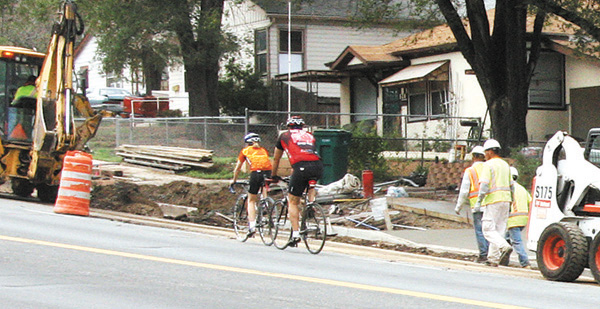West Uintah project this fall to install bike lanes, sharrow markings
 A photo taken on a recent rainy afternoon looks west
on Uintah Street toward its intersection with 19th Street. City plans for the project
this fall show bike lanes on both sides of Uintah from Mesa Road to 19th, with
sharrow markings from 19th to 30th.
A photo taken on a recent rainy afternoon looks west
on Uintah Street toward its intersection with 19th Street. City plans for the project
this fall show bike lanes on both sides of Uintah from Mesa Road to 19th, with
sharrow markings from 19th to 30th.
Westside Pioneer photo
|
The work will primarily consist of street signs and pavement striping, according to Mike Chaves of City Engineering.
The markings will define 6-foot-wide bicycle lanes on either side of Uintah from Mesa to 19th Street. From 19th to 30th, plans show, Uintah will be marked for shared lane markings - also called sharrows.
Sharrows are markings imprinted on the pavement that recommend where cyclists can position themselves in traffic lanes. They are different from dedicated bike lanes, which indicate where only bikes can go.
 Bicyclists ride past a project area to widen Uintah Street on its north side between Walnut Street and Walnut Street in August 2013. That work, since completed, made room for bike lanes on both sides of Uintah. Westside Pioneer file photo
|
The sharrow issue has proven sensitive on the Westside in the past. In 2011, when it was learned that the city was planning sharrows on West Colorado Avenue without advance notice to the public, there was a citizen backlash and the Mayor's Office directed that the project be shelved.
No public meeting is scheduled for the upcoming project either, although the idea of improving Uintah for bicycles west of I-25 is now new. Concepts including bike lanes and sharrows were presented at a 2012 public meeting that also discussed a range of future capital improvements there.
The city also has a grant for 80 percent of the costs (its general fund will cover the 20 percent “match”). Following advocacy from the local bicycling community, the city had applied for and was awarded a federal Transportation Enhancement (TE) grant in 2008. A document by Kristin Bennett, a city planner at that time, included the explanation that the Uintah bike lanes/sharrows are needed because the street “is an important east-west arterial street connecting the west side of the city with the central part near the north end of the Colorado College campus.”
The $150,000 amount appeared in City Engineering documents provided by Chaves to the Pikes Peak Rural Transportation Authority (RTA) at its July meeting. However, asked after the meeting if that number didn't seem high for “just” signage and striping, Chaves replied in an e-mail, “My estimate on the bike lanes is closer to $100,000-125,000. Striping and signage runs about $75,000 with mobilization and traffic control being the remainder. The mobilization and traffic control are lump-sum items and are real variable when actually bid. I used a conservative (high) number for the estimate so the bids may be lower than my number.”
Because federal funds are involved, labor costs have to be equivalent to union wages under the Davis-Bacon law. Asked about that impact, Chaves said, “Contractors tell me Davis/Bacon wages don't drive prices up much. Maybe 5 percent.”
Regarding the project start, Chaves said he can't be more precise than “fall” because the Colorado Department of Transportation (CDOT) needs to sign off on the related documents (as overseer of the federal grant), and the time that will take cannot be predicted with certainty.
The Mesa-to-30th bicycle upgrades will be in addition to the recent $375,000 project that created bike lanes on Uintah between Walnut and Mesa. The original project scope had only accounted for bike lanes on the north side of that segment - as part of a street widening there that also made room for a sidewalk. However, the RTA board allocated $39,000 in additional RTA funds to pay for bike lanes on the south side.
Westside Pioneer article
(Posted 7/16/14;
Transportation:
Uintah Street)
Would you like to respond to this article? The Westside Pioneer welcomes letters at editor@westsidepioneer.com. (Click here for letter-writing criteria.)